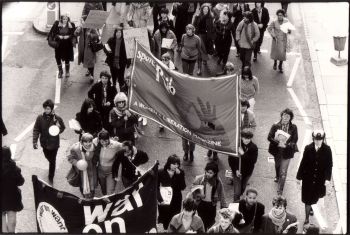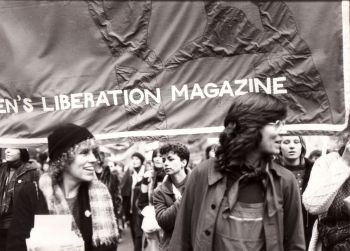Sussex research helps create first-ever national oral archive for Women’s Liberation at British Library
Posted on behalf of: University of Sussex
Last updated: Monday, 4 March 2013

Women's protest as featured in Spare Rib. Photo: Jill Posener

Women on a march, as featured in Spare Rib. Photo: Jill Posener
Sisterhood And After, a unique national oral history archive that tells the stories of the women involved in the Women’s Liberation Movement, is to be launched on International Women’s Day (8 March) by the British Library in partnership with the University of Sussex and The Women’s Library, London.
A Sussex team comprising Research Fellow Dr Rachel Cohen, documentary film-maker Lizzie Thynne (assisted by ex-Media Film and Music MA student Peter Harte) and led by Dr Margaretta Jolly, Reader in Cultural Studies in the department of Media and Film, was funded to interview key activists about their experiences to ensure that their stories endure.
From Spare Rib to Greenham Common, the Southhall Black Sisters to the Northern Ireland Women’s Rights movement, the Women’s Liberation Movement of the 50s, 60s, 70s and 80s transformed the lives of men and women and shaped the world we live in today.
The oral history archive brings together the diverse experiences of the women involved in this movement for the first time, including issues ranging from reproductive rights, equality and independence to marriage and sexual rights.
Dr Jolly says: “The generation of women who powered the Women’s Liberation Movement in its heyday are mostly now in their 60s and 70s. For many, memories of a youth in which feminism was part of everyday life are vivid. For others, those memories are difficult, or fading. It is important to record their stories for future generations, before it’s too late.”
Over 400 hours of unedited recordings from the archive will be made available in the reading rooms of the British Library, and highlights from the archive, including edited clips, ten bespoke films and stories will be launched in a new learning website from 8 March.
The project, funded by the Leverhulme Trust, was developed over the last four years in response to a demand from the activists themselves, who felt their stories had never been recorded in full before.
Around 60 women have taken part in the project so far, and the archive hopes to continue adding voices and stories over time.
Participants include well-known figures such as Susie Orbach, author of Fat is a Feminist Issue and Jenni Murray, the voice of Radio 4 Woman’s Hour, as well as lesser known stories, such as:
- Una Kroll, a former doctor and nun who campaigned for women’s right to be priests;
- Rowena Arshad, a trade union activist who co-organised a pioneering black women’s refuge in Scotland;
- Betty Cook, a miner’s wife who became politicised during the miners’ strike, forming ‘Women Against Pit Closures’;
- and women involved in campaigns such as the Miss World protest, the Grunwick Strike, Reclaim the Night, the Equal Pay Act and many more.
Dr Jolly says: “An oral history archive lends itself perfectly to the nature of the Women’s Liberation Movement, capturing the diverse and wide-ranging thoughts and experiences of the women themselves rather than the official history. By listening to the oral histories we are able to hear first-hand the stories of these women, and we hope to bring the history of the Movement to a new generation of young people for whom these debates and issues still resonate today.”
Dr Polly Russell, Lead Curator in Social Sciences at the British Library, says: “Oral history is a powerful means of recording the unique memories and life experiences of people, whose stories might otherwise have been lost. This oral history archive will be an invaluable resource to researchers now and in the future to understand what this generation achieved, and to learn about the women’s liberation movement in their own words.”
For more information visit the British Library website.

